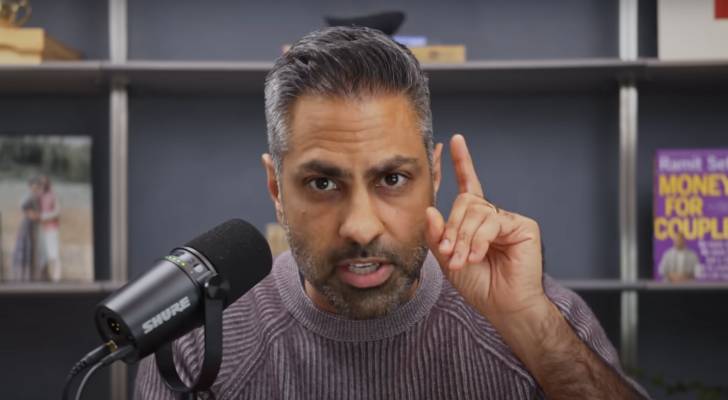We adhere to strict standards of editorial integrity to help you make decisions with confidence. Some or all links contained within this article are paid links.
Celebrities and athletes often aim to turn fame into fortune, but billionaire investor Mark Cuban warns they often mismanage their earnings.
On the "Club Shay Shay" podcast with Shannon Sharpe, Cuban shared blunt advice for those who suddenly come into wealth: “Don’t invest in the restaurant, don’t invest in the clothing label, don’t invest in the liquor company … or music,” he said. “That is the death!”
Here’s why Cuban, a seasoned entrepreneur, avoids these flashy ventures with “no barriers to entry.”
Barriers to entry
Cuban’s advice to people with lots of money to invest is to hire somebody to manage it. "It cannot be your friend," he added. "It’s got to be somebody who’s done it for big time people."
He warns against investing in industries like clothing, restaurants, or liquor, calling them “too easy to enter…those businesses are hard because there’s no barriers to entry.”
Barriers to entry, as defined by the Corporate Finance Institute, are factors like regulations, licensing, technology, or patents that restrict competition and enhance profitability.
But navigating investments in complex industries with high barriers to entry typically requires professional expertise. Advisor.com can help you find the right experts to navigate these barriers.
Advisor.com (ADVR LLC), a Registered Investment Adviser, connects you with unaffiliated third-party RIAs through its matching tool and offers in-house guidance via Advisor Wealth Management (AWM).
With Advisor, you gain access to tailored strategies and professional advice to help you identify promising opportunities while avoiding common pitfalls.
In contrast to high-barrier opportunities, Cuban’s point is that launching a clothing line or restaurant requires minimal investment or expertise, making it easy for anyone to enter. This flood of competition reduces pricing power and profitability. Indeed reports the average profit margin for a full-service restaurant is just 3% to 5%.
Investors and entrepreneurs should keep an eye on the barriers to entry and whether they are backing a product that is truly exceptional.
Boring businesses (and alternatives)
Boring, unglamorous industries can act as barriers to entry simply because they lack broad appeal. Few dream of starting waste disposal firms or pest control services, but Cuban would probably agree that these industries can be lucrative for those willing to forgo bragging rights.
Legendary investor Warren Buffett has built a fortune by betting on "boring" businesses. As of Q3 2024, his portfolio includes companies like Chubb Limited (insurance) and DaVita (kidney treatment), demonstrating his knack for spotting undervalued, overlooked opportunities.
For guidance on navigating “boring” but profitable industries, you could turn to Moby, an investment research platform led by former hedge fund analysts.
Moby provides expert stock reports backed by hundreds of hours of research, breaking complex market data into simple insights. With stock picks outperforming the S&P 500 by nearly 12% over the past four years, Moby equips investors with a rare edge to uncover opportunities in undervalued sectors.
For example, when you consider the low competition and steady demand in industries like logistics, utilities, energy, or enterprise software, Moby can help you tap into these opportunities where profitability often thrives.
Premium subscribers also benefit from a 30-day money-back guarantee, making it a solid tool for making smarter, data-driven investment decisions.
Real estate
While "boring" businesses may thrive in overlooked niches, real estate offers an alternative way to invest in steady, income-generating assets.
Real estate offers a stable option for those seeking long-term income generation and inflation-resistant growth. Whether through residential properties, commercial developments, or specialty niches, real estate has proven its resilience during volatile economic periods.
For example, First National Realty Partners (FNRP) specializes in grocery-anchored retail properties, a sector known for resilience during economic volatility. FNRP gives accredited investors access to expert guidance and a team that manages every aspect of the investment process – from due diligence and leasing, to property management and upside.
By leasing to essential-needs brands like Kroger, Walmart, and Whole Foods, FNRP creates opportunities for passive income and inflation-hedged growth via a personalized investor portal.
Artwork
Alternative investments like art have become increasingly popular among investors looking to diversify beyond traditional asset classes.
Historically, fine art has shown resilience during market downturns and the potential for strong returns, making it an attractive option for savvy investors seeking low-volatility assets. The good news is that art investing, once limited to accredited investors and ultra-wealthy, is now accessible to everyday investors through platforms like Masterworks.
Specializing in blue-chip works by artists like Basquiat, Masterworks [fractionalizes ownership] of iconic pieces. With every one of its 23 art sales yielding profits, Masterworks is revealing the value of art as a solid alternative asset.
Masterworks takes care of all the heavy lifting from buying the paintings, to storing them, to selling them opportunistically for you — no art experience required.
See important Regulation A disclosures at Masterworks.com/cd
Gold
For centuries, gold has served as a trusted store of value, especially during economic uncertainty. As a hedge against inflation and a stabilizer for fluctuating markets, gold remains a cornerstone of diversified portfolios. Those looking to incorporate precious metals into their retirement strategy can benefit from modern investment solutions, like those offered by companies like American Hartford Gold.
American Hartford Gold is a leading precious metals dealer – allowing you to invest directly in gold or silver.
With secure storage, expert guidance, and customizable investment plans, American Hartford Gold helps investors diversify their portfolios while protecting against inflation. Gold IRAs provide a tangible safeguard for retirement savings, combining financial security with significant tax advantages, making them an appealing choice for long-term wealth preservation.
This article provides information only and should not be construed as advice. It is provided without warranty of any kind.


